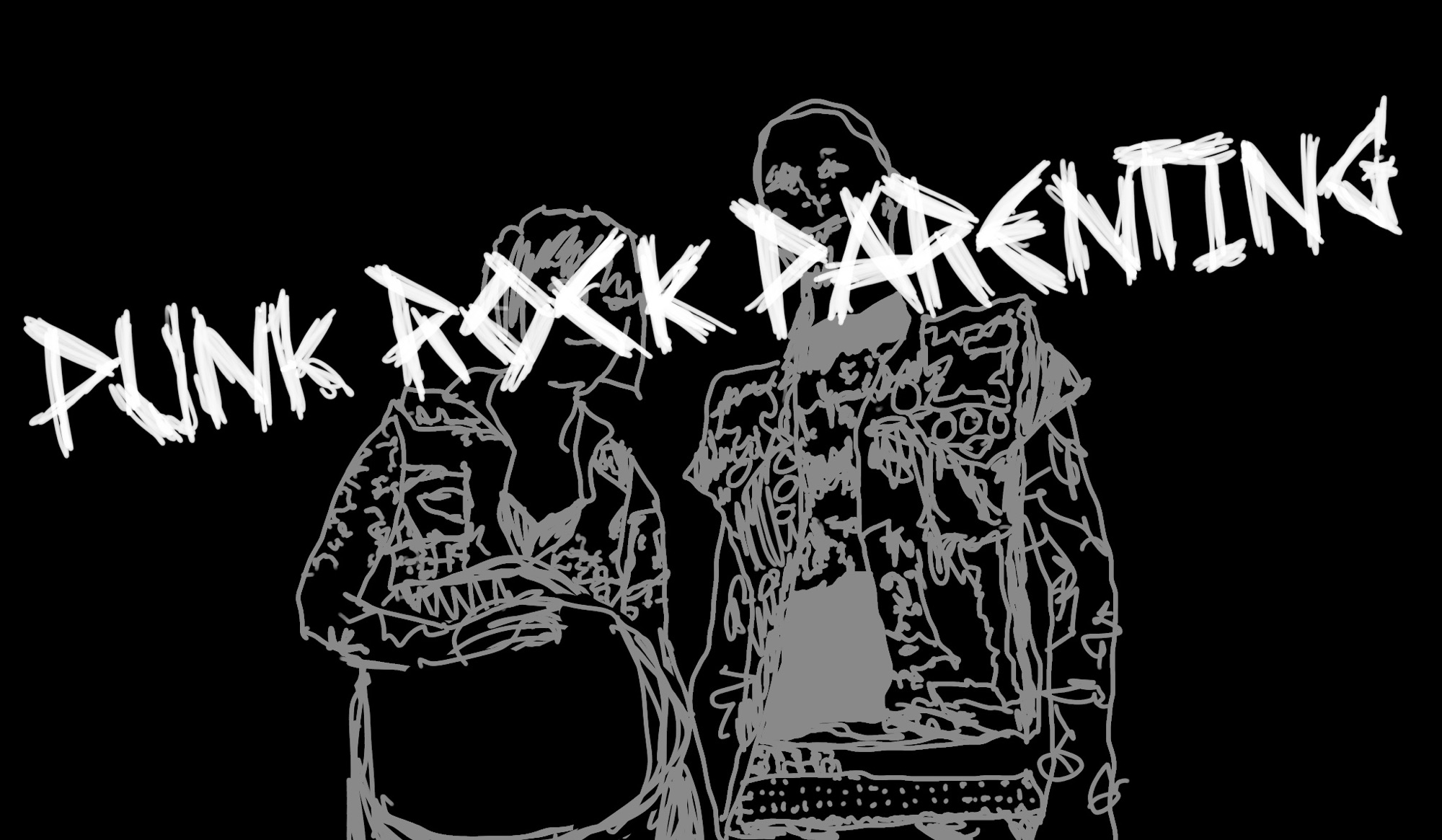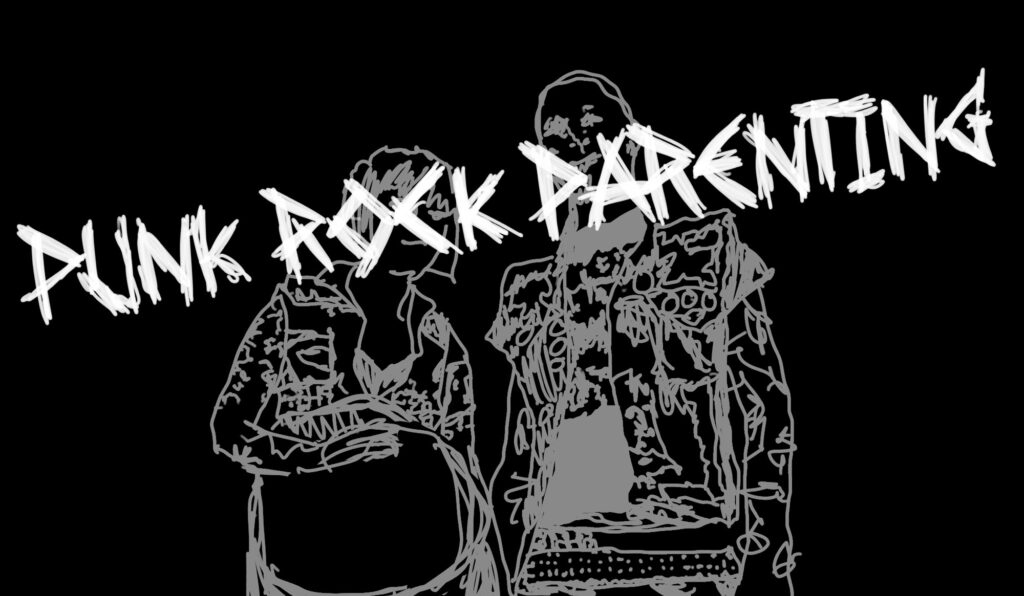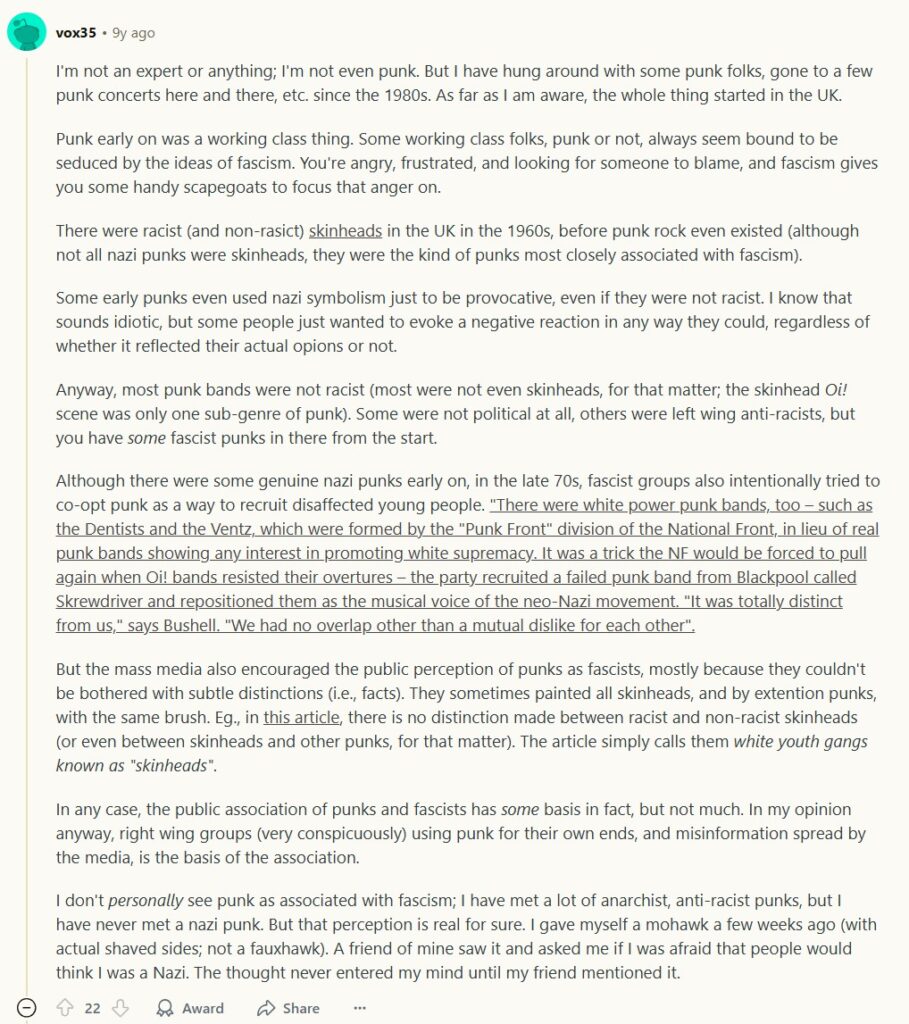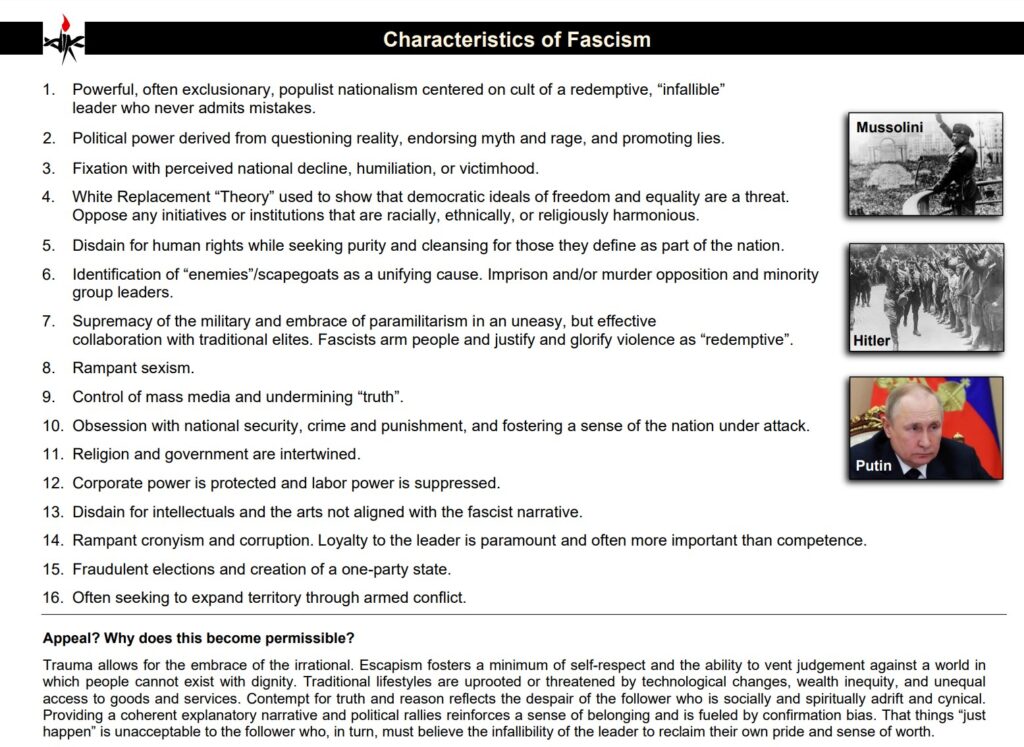On Punk Rock, Privilege & Parenting

The first time I fell in love, it was with a punk. He had bright blue-green eyes and his bleached hair was spiked out with Elmer’s glue. The preppy, pretty girls in my class with ribbons in their hair perfectly plaited by their GMC-Suburban-driving moms knew him from their last school and they introduced us. When he asked me out, he couldn’t have had better wingwomen. I yearned to be put together—“perfect” like those cheerleaders in waiting. To be among them. I said yes.
Oh. And we were in the sixth grade.
But that didn’t make him any less punk rock. He rode his bike to feed the homeless every Wednesday with Food Not Bombs. He was the first kid I knew who chose to be a vegetarian. When the circus came to town, he went to PETA protests. He silkscreened patches of his favorite punk bands, hand sewed them to his thrifted clothes. He played the drums skillfully, the guitar and bass just because he could, and was regularly at smoky warehouse shows where people would scream into a microphone while everyone nodded their heads. He philosophized about anarchy, and introduced me to Animal Farm by George Orwell. He was a feminist, an anarchist, and made me question what I was told about religion. He also…stunk. He was a kid, but he was a punk rock kid, blending in with a bunch of adults and almost adults in the scene. Fully integrated.
This little punk quickly became my everything. He told me he loved me one day, and it was over. (I’m fatherless, remember?) I chased him around for all of middle school, and more in to high school than I would like to admit.
A by-product of my obsession with the least hygienic but most interesting 6th, 7th & 8th grader was being immersed in punk ideology. At the age of a bat mitzvah, I was coming of age in opposition to capitalism and conformity. It became who I was and it still lives within, despite my current lifestyle.

What Punk Did
Punk made philosophy cool
You were what would be deemed now “edgelord” in fashion but an intellectual in taste. You looked different and liked loud music that offended the right people, but it was moreso about having strong opinions about politics, the state of the world, and what should and should not be valued.
Being poor was better
Having ratty old stuff held together with safety pins or thrifting wasn’t a declaration of financial despair, it was a statement about anti-establishment. The same applied regarding making your own stuff—you wouldn’t be caught dead in some pristine, Hot Topic representation of the subculture. It had to be homemade.
Distrust was a hallmark of intelligence
We didn’t distrust authority because we were traumatized, neglected or abandoned kids (at least we didn’t think so)—we distrusted authority because we questioned their motives. They were cogs in a system. If they didn’t realize that, they lacked good judgement from our perspective.
We learned to be loud
Punk music screams: the volume is loud, the instruments often clashing. Yet it’s loud outside of the music and loud clothing. Through punk, we learned to dissent. To be punk rock was to be aggressively opinionated. To argue loudly with our counterparts about what constituted punk rock, what it meant to be part of the movement.
We leaned in to outcast
The outlandish clothing, hairstyles and piercings were an external representation of a set of values we shared. We already thought different, why shouldn’t everyone know? Those preppy girls shared a classroom with me briefly but I certainly wasn’t in the same class—they’d be waving from their lifeboats as I sank with the Titanic. When I adopted punk ideology, I no longer wanted to be among them; they were representations of a system I chose to shun.
Group conscience was the norm
Though we accepted being outside of a mainstream culture, we still were adopting a subculture that had its own set of norms and mores. In the late 90’s and early 2000’s, the argument of “Punk is Dead” or not proliferated. Did punk mean the same thing as it once had, or did people merely adopt the style of music and dress?
“‘Punk is Dead’ vs ‘not dead'” was one of many topics that were frequently revisited, but Punk in itself and the meaning of the marker that we chose to identify ourselves with was under constant scrutiny and discussion. In it’s essence, to be punk was to consistently question.
Friends that didn’t adopt punk fashion or preferred other expressions of music still shared the same ideology, yet would refer to themselves through other terms: “Anti-prep,” “Anti-conformist,” Anarchist. Defining the self through what they are sure that they were not in favor of, asserting that they had considered the norm and they were intentionally living outside of it.
Where there were punks, there were Nazis.
I didn’t understand it then–I didn’t understand it this morning, until I stumbled upon u/vox35’s response to a reddit post about punk & fascism.

I was a kid, and kids just accept certain realities. The fact of the matter is that Nazis would try and show up at the same shows, same hangouts. They’d sport tartan pants with similar black fabric patches with white silkscreen ink. Except amongst those patches, you’d see a swastika.
Punks are angry, but not surprised, when fascists do what fascists do, including promoting lies and creating disillusion by pretending to align with punk ideals. We know what a punk is and we know a Nazi when we see one. We were paying attention before they were so brazen.

Punk Rock Parenting
Punk rock ideals melded me from a young age, and those values are the same that I pass down to my children, even before they had grasped smaller concepts.
When my children were old enough to point at character-laden processed food packaging at the grocery store, I would tell them: “Ha! Those people are trying to trick us! They know kids like you like that show, so they’re trying to take our money. This cereal is not good, that’s why they have to try to trick us with the character. We’re smarter than that, right?” And I’d give them a knowing nudge.
–
When my oldest was a freshman in high school and about a year in to regular Snapchat use, I sat him down after a month-long Snap grounding to share the news.
“You’re not getting Snapchat back.”
Of course, he was upset. Much of teen communication revolves around the app. He was arguing his case, gaining intensity as his arguments were met with the same answer, before he pulled out this one:
“You’re just like Ronald Reagan–he made up the war on drugs because there were all these other problems going on and he wanted to pretend like drugs were the problem. That’s you and social media. There’s all these other problems and not Snapchat”
I scoffed. “Ha! Snapchat just wants to force-feed ads to you like foie gras! You know, you’re into skate culture now, but when I was a kid, skate culture wasn’t about all of these brands, it was anti-conformist. It was cheap. I don’t want you inundated with all of this consumerist crap. I’m not Ronald Reagan. I’m not. I’m—I’m punk rock!”
“No, you’re Ronald Reagan.”
“I’m Punk Rock.”
“Ronald Regan!”
“Punk Rock!”
And so it continued.
I don’t doubt this will continue to be amongst my favorite arguments with my kids through my life.
(And if you’re wondering, no, he didn’t get snapchat back. My children won’t have social media until they are adults. Recently my 16 year old admitted he’s not interested in doing so even then.)
ADS. To be anti-consumerism is a revolutionary act in a society built around a feeling of lack. I can’t stand the ways in which business owners attempt to seamlessly integrate advertisements throughout our everyday lives. I want to choose quality products that come at a cost that I am willing to pay, I do not want to be tricked into a free or “cheap” item or service only to be inundated with advertisements.
Though I live a suburban lifestyle that would astonish my childhood self, I still carry the privilege of anti-establishment ideals that encourages consideration before commitment, not following the herd, and doing what is in line with my ideals rather than what has always been done. I pass those ideals onto my children and we all lead more fulfilling, authentic lives because of it.
That’s the privilege of punk rock.
What do you think?